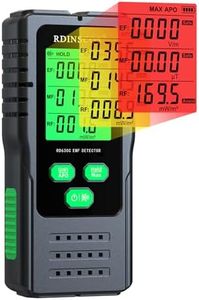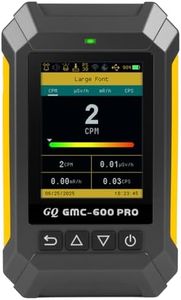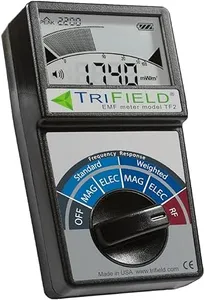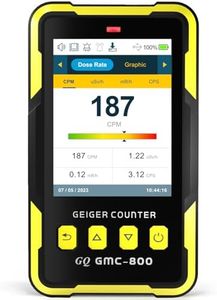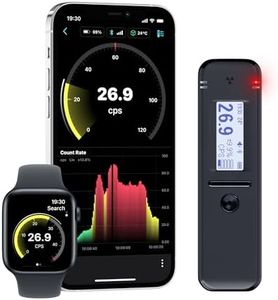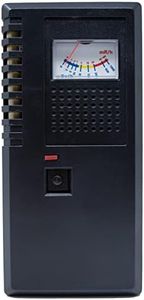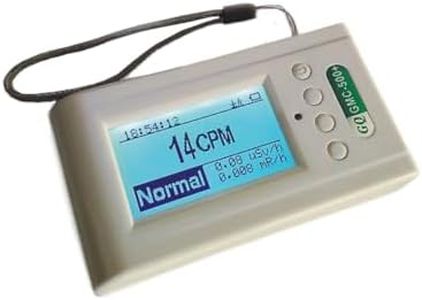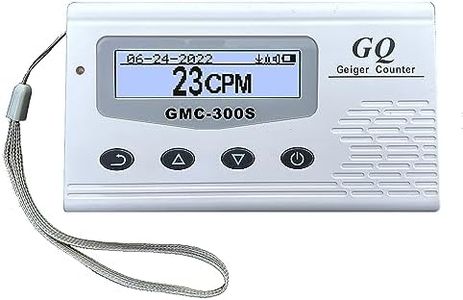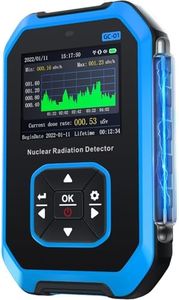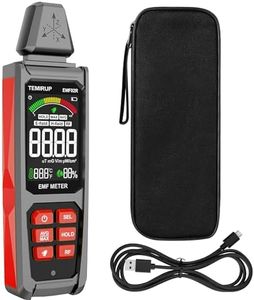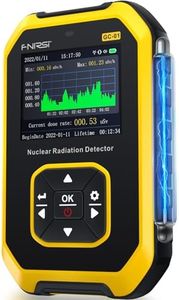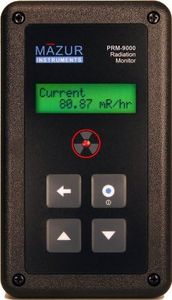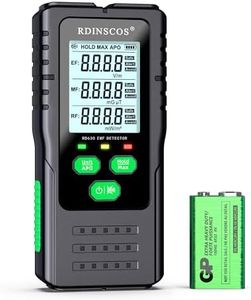10 Best Radiation Meters 2026 in the United States
Our technology thoroughly searches through the online shopping world, reviewing hundreds of sites. We then process and analyze this information, updating in real-time to bring you the latest top-rated products. This way, you always get the best and most current options available.

Our Top Picks
Winner
GQ 600 PRO Geiger Counter Nuclear Radiation Detector – Dosimeter for Alpha, Beta, Gamma, X-Ray – Portable Radiation Monitor with Real-Time Data, Global Data Sharing, LCD Display & USB
Most important from
226 reviews
The GQ GMC-600 PRO is a versatile radiation meter designed to detect a wide range of radiation types including alpha, beta, gamma, and X-rays, thanks to its advanced LND 7317 Pancake Geiger Tube. This provides professional-level sensitivity, making it reliable for both indoor and outdoor use. It measures radiation continuously and logs data every second, which is ideal for detailed tracking and spotting trends over time.
The device features a clear LCD display with large fonts and multiple viewing modes, making reading measurements straightforward even for beginners. One standout feature is its built-in WiFi, allowing automatic data upload to an online map with unlimited cloud storage. This enables remote monitoring of radiation and access to historical data from anywhere, which benefits users interested in sharing or reviewing data later. The rechargeable battery and USB-C charging add convenience for extended use without frequent replacements.
Weighing only 1.6 pounds with a compact size, the GMC-600 PRO is portable enough for fieldwork or personal safety checks. It is well-suited for hobbyists, professionals, and safety-conscious individuals who want a reliable, portable detector with modern data-sharing features, although users may need some time to become familiar with its software and data export options.
Most important from
226 reviews
TriField EMF Meter Model TF2 – Made in USA - #1 Handheld EMF Detector for Magnetic/Electric/Radio Fields with Unlimited Free Support in The U.S. to Help Solve Your EMF Problems
Most important from
3508 reviews
The TriField EMF Meter is designed for users who need to measure electromagnetic fields (EMF) from various sources, including 5G cell towers, WiFi, and smart meters. One of its key strengths is its ability to detect three types of fields: magnetic, electric, and radio/microwave. This broad detection capability makes it a versatile tool for individuals concerned about EMF exposure in their environment. The dual mode for standard and weighted frequency responses is particularly beneficial, as it allows users to understand both standard readings and those that may impact the human body more significantly.
In terms of sensitivity and accuracy, the TriField meter is well-regarded for providing reliable readings. The measurement range is adequate for most household and outdoor applications, but those needing extremely fine measurements may want to look elsewhere. The response time is quick, allowing for real-time monitoring of EMF levels, which can be vital for assessing exposure in dynamic environments.
The display is user-friendly, showing field signal levels and peak levels, along with a fast indicator bar for RF pulse monitoring, making it accessible for non-tech-savvy individuals. Portability is another plus; it is lightweight and compact, making it easy to carry around for field measurements. Battery life could be a concern for heavy users, as it requires a 9V battery, which may need regular replacement depending on usage frequency. Although it is manufactured in the USA and comes with a one-year warranty, some may find the initial investment a bit steep compared to more basic models. The TriField EMF Meter is a solid choice for anyone looking to monitor EMF pollution in everyday life, striking a good balance between functionality and ease of use, while still having some limitations in precision and battery longevity.
Most important from
3508 reviews
Nuclear Radiation Detector GQ GMC-800 Geiger Counter USA Design Product US National Standard Large Color LCD Display 5 Alarm Types Dosimeter Data Save & Global Share Beta Gamma X-ray Portable Device
Most important from
855 reviews
The GQ GMC-800 Geiger Counter stands out in the radiation meter category for its user-friendly design and advanced features. It accurately detects various forms of radiation including beta, gamma, and X-ray, making it suitable for personal and group use. One of its strengths is the large, color LCD display, which is easy to read even in bright sunlight, particularly beneficial for outdoor use. The device also boasts multiple alarm types, catering to users with visual or hearing impairments, enhancing its accessibility.
In terms of functionality, it offers real-time measurements and the ability to monitor radiation over time, providing a comprehensive overview of radiation exposure. The memory function stores data for up to 10 years, along with data sharing capabilities, which is an added advantage for those who need to track readings over time.
Portability is another strong point, as it is lightweight and comes with a rechargeable battery, allowing for easy transport and extended use without frequent recharging. However, the device's reliance on technology might present a slight learning curve for some users, even with its user-friendly interface. While the GMC-800 meets US national standards for accuracy, its performance in very high radiation environments might be limited compared to some professional-grade models. Additionally, for users primarily interested in basic radiation detection, the advanced features may be overwhelming or unnecessary, potentially making the device feel more complex than needed.
Most important from
855 reviews
Buying Guide for the Best Radiation Meters
Choosing the right radiation meter is crucial for ensuring safety and accuracy in environments where radiation levels need to be monitored. Whether you are a professional working in a field that requires radiation monitoring or a hobbyist interested in measuring radiation levels, understanding the key specifications of radiation meters will help you make an informed decision. Here are the key specs you should consider when selecting a radiation meter and how to navigate them to find the best fit for your needs.FAQ
Most Popular Categories Right Now
